新概念英语第二册lesson33 out of the darkness课件(共30张PPT)
文档属性
| 名称 | 新概念英语第二册lesson33 out of the darkness课件(共30张PPT) |  | |
| 格式 | pptx | ||
| 文件大小 | 734.7KB | ||
| 资源类型 | 教案 | ||
| 版本资源 | 新概念英语 | ||
| 科目 | 英语 | ||
| 更新时间 | 2023-10-06 09:42:17 | ||
图片预览

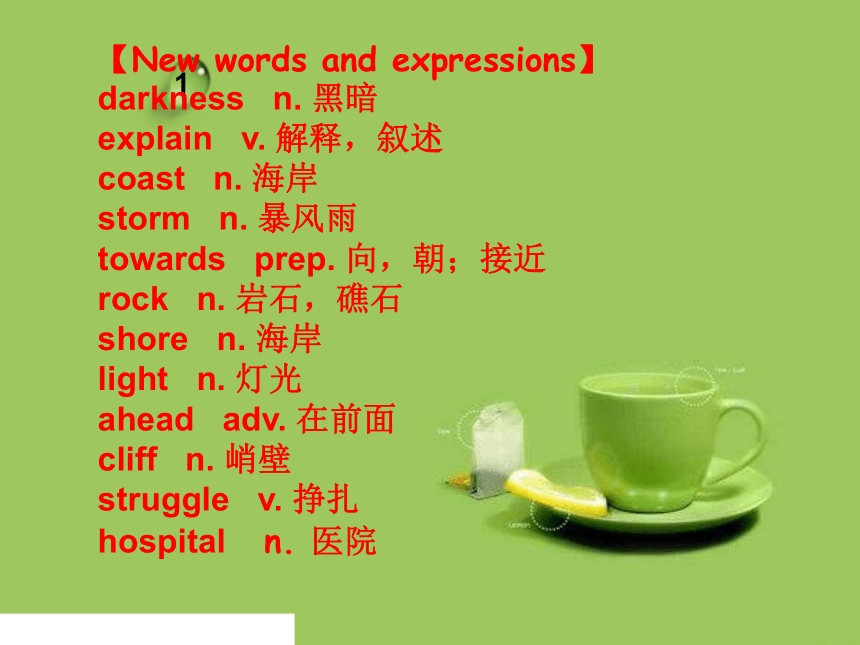
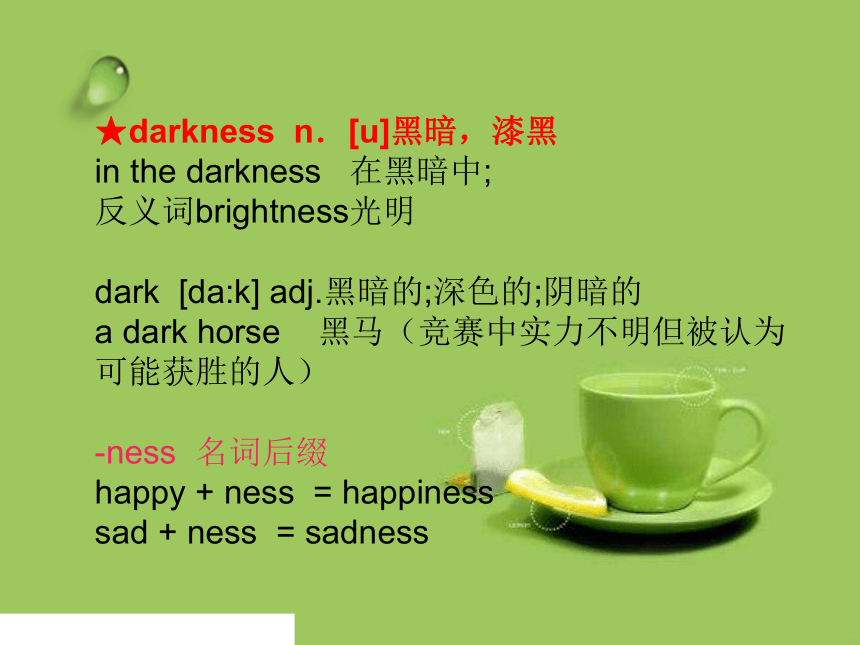
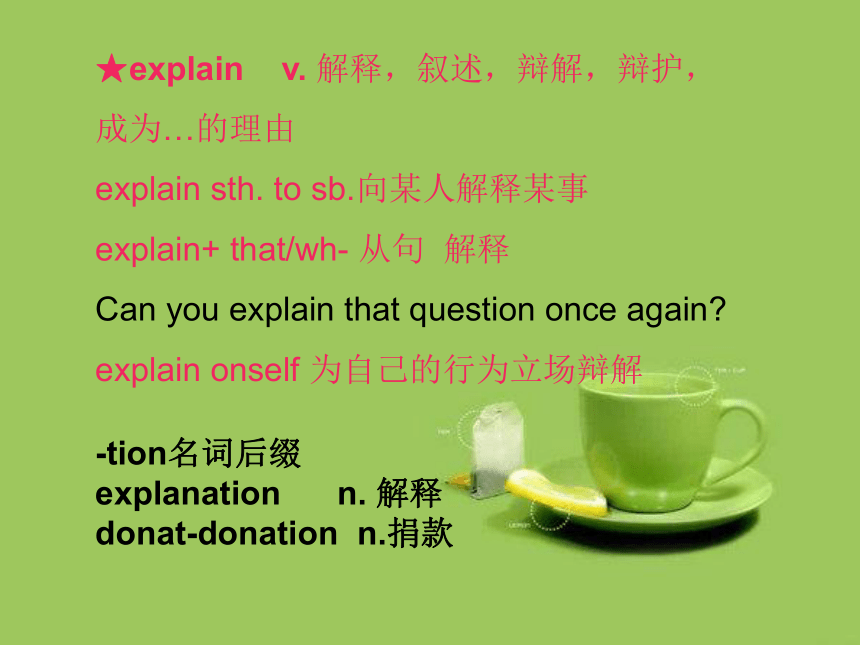
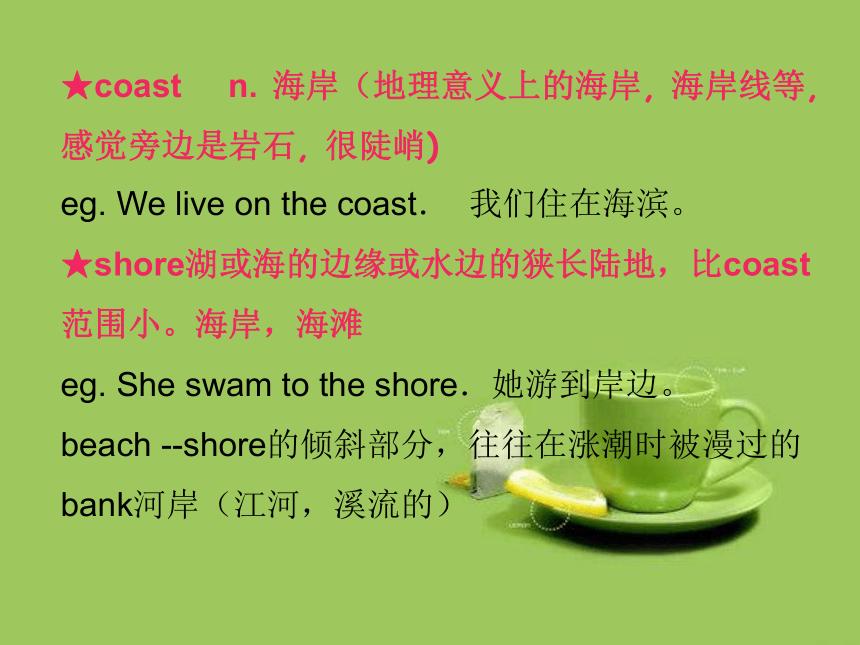
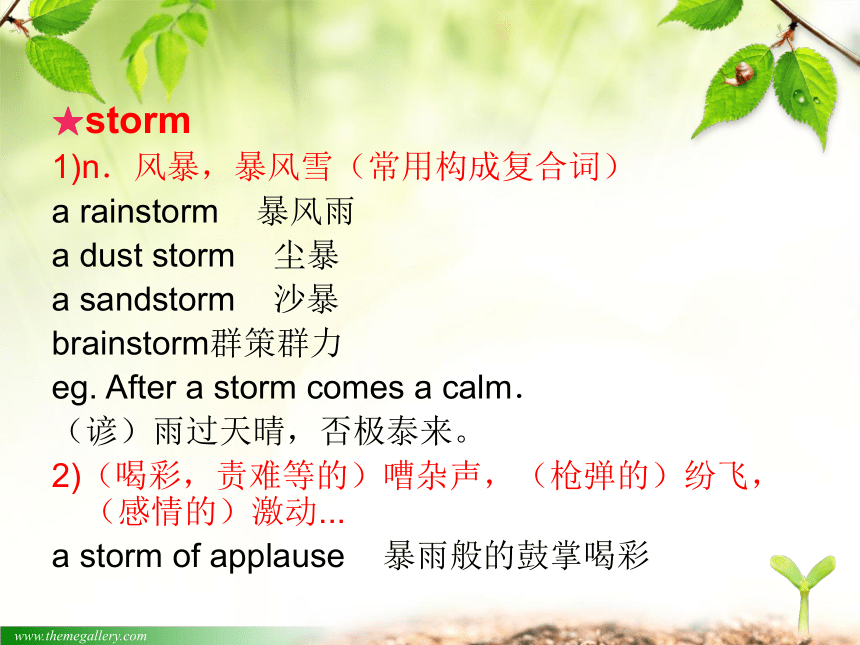
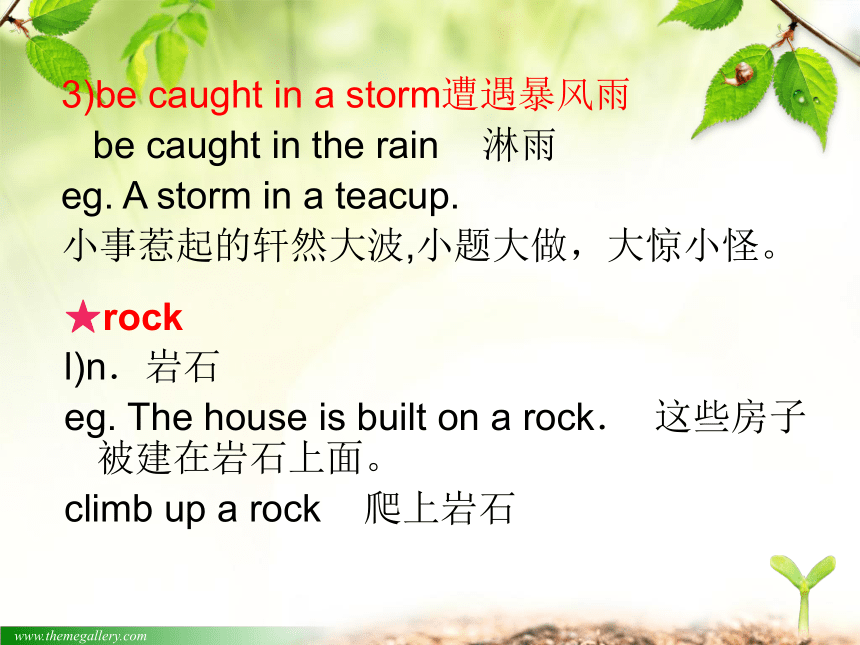
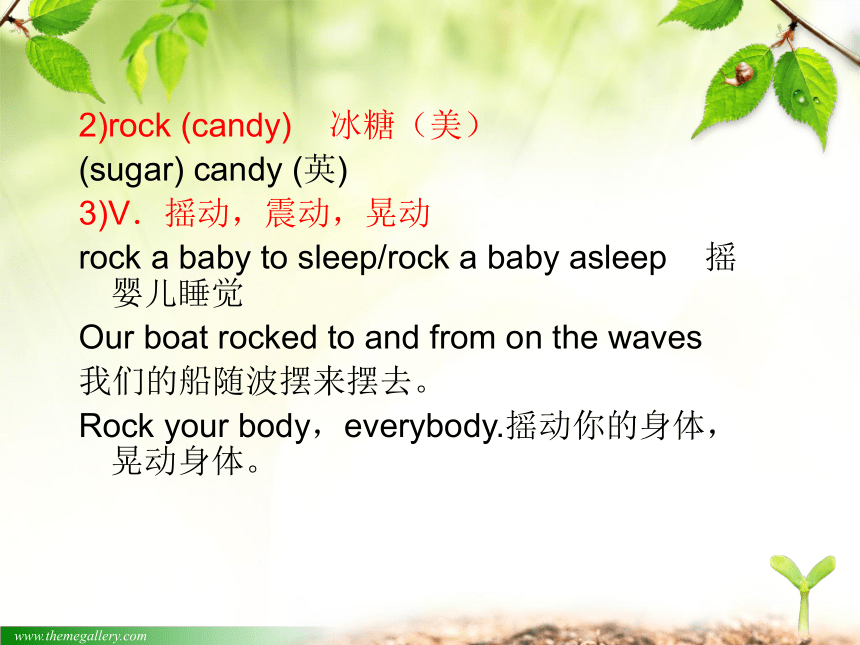

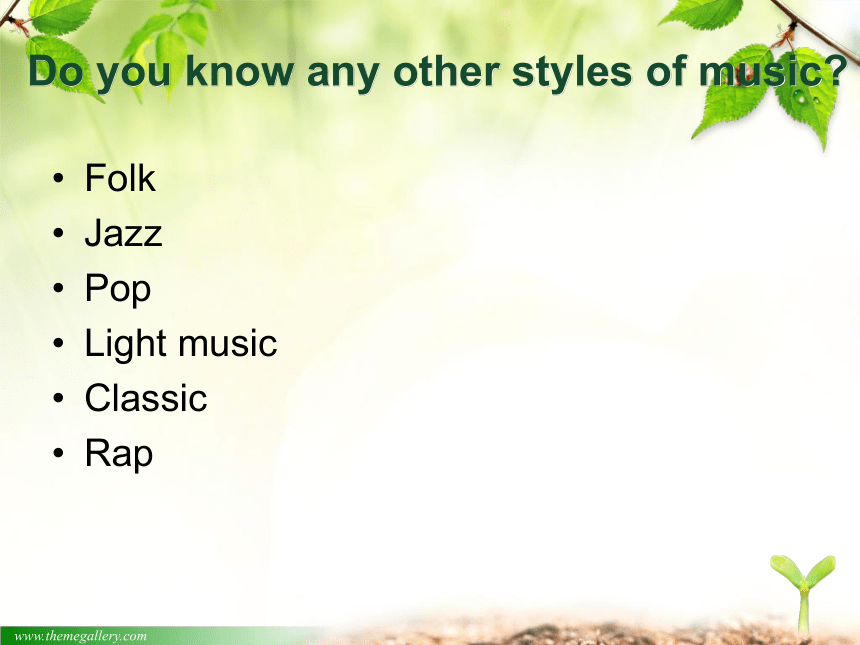


文档简介
(共30张PPT)
lesson33 out of the darkness
1
【New words and expressions】
darkness n. 黑暗
explain v. 解释,叙述
coast n. 海岸
storm n. 暴风雨
towards prep. 向,朝;接近
rock n. 岩石,礁石
shore n. 海岸
light n. 灯光
ahead adv. 在前面
cliff n. 峭壁
struggle v. 挣扎
hospital n. 医院
★darkness n.[u]黑暗,漆黑
in the darkness 在黑暗中;
反义词brightness光明
dark [da:k] adj.黑暗的;深色的;阴暗的
a dark horse 黑马(竞赛中实力不明但被认为可能获胜的人)
-ness 名词后缀
happy + ness = happiness
sad + ness = sadness
★explain v. 解释,叙述,辩解,辩护,成为…的理由
explain sth. to sb.向某人解释某事
explain+ that/wh- 从句 解释
Can you explain that question once again
explain onself 为自己的行为立场辩解
-tion名词后缀
explanation n. 解释
donat-donation n.捐款
★coast n. 海岸(地理意义上的海岸, 海岸线等, 感觉旁边是岩石, 很陡峭)
eg. We live on the coast. 我们住在海滨。
★shore湖或海的边缘或水边的狭长陆地,比coast范围小。海岸,海滩
eg. She swam to the shore.她游到岸边。
beach --shore的倾斜部分,往往在涨潮时被漫过的
bank河岸(江河,溪流的)
★storm
1)n.风暴,暴风雪(常用构成复合词)
a rainstorm 暴风雨
a dust storm 尘暴
a sandstorm 沙暴
brainstorm群策群力
eg. After a storm comes a calm.
(谚)雨过天晴,否极泰来。
2)(喝彩,责难等的)嘈杂声,(枪弹的)纷飞,(感情的)激动...
a storm of applause 暴雨般的鼓掌喝彩
3)be caught in a storm遭遇暴风雨
be caught in the rain 淋雨
eg. A storm in a teacup.
小事惹起的轩然大波,小题大做,大惊小怪。
★rock
l)n.岩石
eg. The house is built on a rock. 这些房子被建在岩石上面。
climb up a rock 爬上岩石
2)rock (candy) 冰糖(美)
(sugar) candy (英)
3)V.摇动,震动,晃动
rock a baby to sleep/rock a baby asleep 摇婴儿睡觉
Our boat rocked to and from on the waves
我们的船随波摆来摆去。
Rock your body,everybody.摇动你的身体,晃动身体。
4)V.使(某人)震惊
例: The news of the president' s death rocked the company.
总裁的去世震惊了整个公司
rock the boat(团队中某个人)兴风作浪,捣乱
5)rock 'n' roll 摇滚乐
20世纪50年代由黑人音乐和西部乡村音乐混合而成
Do you know any other styles of music
Folk
Jazz
Pop
Light music
Classic
Rap
★light
1) n.光线,光亮
the light of the sun 阳光
the light of the lamp 灯光
the light of the fire 火光
2) n.光源,尤指电灯
turn on the light打开灯
turn off the light关掉灯
eg. From the TV tower, we can see the lights of Beijing.
从电视塔上,我们可以看到北京的万家灯火。
3)n.火柴,打火机等的火
eg. Can you give me a light 能借个火吗?
Put a light to sth 点火
according to one' s lights 根据自己的判断能力
bring sth to light 揭露
eg. His past was brought to light. 他的过去公布于众。
★struggle
1) v.斗争
struggle with sb/fight with sb和…打斗
例: The landlord struggled with the thief.
店主和小偷扭打在一起。
struggle for sth 为…斗争,努力
struggle against sth 反对…而斗争
fight for freedom /struggle for freedom为自由而战
eg.Chinese people struggle against Japanese for eight years.
中国人民同日本侵略者斗争了八年。
★hospital n.医院
an emergency hospital 急诊医院
go into (the) hospital 住院
/be in (the) hospital
leave (the) hospital 出院
住院,出院在美国英语要加the,在英国英语中则通常不加the。
易混淆的词
hospitality n.[u]殷勤招待,厚待['hospi'taeliti]
give hospitality to a person
show hospitality to a person款待(某人)
★ahead
1) adj./adv.(空间性的)在前面,反义词:behind
eg.He passed me and ran ahead.
2)(时间性的)预先,事先
think ahead 事先考虑
plain ahead 事先计划
eg.Try to look ahead to the future.
事先计划一下将来
3)go ahead 朝前走;请随便(回答请求时用)
--Can I use your telephone
--Ok, go ahead.
表语形容词
asleep睡着的 alive活着的
ahead前面的 alight明亮的
awake醒着的 alone 孤单的
作用相当于副词,都放在名词的后面(一般形容词放在名词的前面)
Nearly a week passed before the girl was able to explain what had happened to her. One afternoon she set out from the coast in a small boat and was caught in a storm. Towards evening, the boat struck a rock and the girl jumped into the sea. Then she swam to the shore after spending the whole night in the water. During that time she covered a distance of eight miles. Early next morning, she saw a light ahead. She knew she was near the shore because the light was high up on the cliffs. On arriving at the shore, the girl struggled up the cliff towards the light she had seen. That was all she remembered. When she woke up a day later, she found herself in hospital.
Questions
1. Where did the girl set out from one afternoon
2. Was she in a small boat or a large one
3. Where did her boat strike
4. What time of day was it
5. How long did she spend in the water
6. How far did she swim
7. When did she see a light ahead of her
8.Where did she find herself when she woke up
Nearly a week passes before the girl was able to _____ what had happened to her. One afternoon she _________ from the _____ in a small boat and was caught ________. Towards evening, the boat _________ and the girl jumped into the sea. Then she ___________ after spending the whole night in the water. During that time she covered a ______ of eight miles. Early next morning, she saw a light ______. She knew she was near the shore because the light was high up ________. On arriving at the shore, the girl _________ the cliff towards the light she had seen. That was all she remembered. When she woke up a day later, she found herself ________.
Fill the blanks
I)Nearly a week passed before the girl was able to explain what had happened to her.
passed/past
当pass用作动词和past用作介词时,它们都有“过去”和“经过”的意思.
pass(动词)He passed my house this morning.
past(介词、名词、形容词和副词)
He walked past my house this morning.
be able to与can的区别
be able to 强调特定的,具体的能力,不仅强调了某种能力,实际做到了或可能做到;
can表示总的能力和客观存在的能力。
He could walk forty miles a day in the past.(能做到,但实际不一定做。)
He was able to walk forty miles a day last year. (能做到,他实际做了。)
what happened to sb. 某人发生了什么
what had happened to sb. 是它的过去完成时态
II) One afternoon she set out from the coast in a small boat and was caught in a storm.
set out = set off = begin a journey 出发
set out from… 从……出发
set up 建立
be caught in
be caught in+灾难 (突然)遇到/上(风暴等)
He was caught in a rain when he left.
遇上人用 meet
遇上灾难用be caught in…
Towards evening, the boat struck a rock and the girl jumped into the sea. Then she swam to the shore after spending the whole night in the water.
towards evening 天将黑的时候;天越来越晚
spend money on sth 在某物上花费
spend time (in )doing sth 在某事上花费时间
strike强调的往往是猛烈的撞击
“to”强调朝那个方向去, 但没有强调越来越近;“towards”朝那个方向去,强调距离越来越近
During that time she covered a distance of eight miles. Early next morning, she saw a light ahead. She knew she was near the shore because the light was high up on the cliffs.
cover可笼统地表示“行过(一段路程)”,根据上下文可具体译为“走过、飞过、游过”等。
eg. By sunset, we had covered 30 miles.
a distance of+具体长度 多长的距离,表示具体的距离
the red army covered a distance of 25000…
a light ahead 前方的一盏灯(ahead 放在被修饰词的后面)
ahead of time =in advance提前
On arriving at the shore, the girl struggled up the cliff towards the light she had seen. That was all she remembered. When she woke up a day later, she found herself in hospital.
on +V-ing相当于一个由as soon as=the moment或when引导的时间状语从句,as soon as=the moment后面要加句子.
on 后面一定要加动词ing, 承认动词是由主句主语做的
eg.on arriving home,it began to rain.(错误)两个不同的主语,不能用on+动名词
up the cliff towards the用两个介词起到动词的作用,up在此处为介词,表示“沿着……往上”
【key structures】
表示方向和目的地的介词和副词
① 表示“上、下”的两对小品词是on和off,up和down
Jim’s standing on the roof. I hope he won’t fall off.
Tom’s climbing up the tree. I hope he won’t fall down.
② 表示“来、去”的一对小品词是from和to/towards;for在有些动词后面也表示“往,向”的意思
He went for home.
leave for… 动身到某地(强调离开,出发)
set out for… 动身到某地
head for/to 前往 (强调“去”)
③ 表示“进去,出来”这两种方向的介词为into(进、入)和out of(从...出来);
表示“在某个地方”或“在……里面/外面”可用at(含有一种瞄准的概念,方向性),in,out of等;表目的地或位置往往用at
aim at,fire at(瞄准开火),throw at,threw to the bank
④ 表示“穿过,越过,绕过”等动词时,往往用through,across,under,over,round等介词
How did you get over the wall
【Special difficulties】
Pass and Past
pass和past的区别主要是词义上的区别,pass是动词,其过去式为passed,过去分词是passed或past。当作及物动词用时,可表示“经过,通过(考试),超过”等,作不及物动词用时可表示“(时间等)消逝”。
I’ve passed/past my French test.
A month has passed/past since I left home.
past可以作形容词、介词、名词等,作形容词时表示“以前的,过去的”等;作介词时表示“经过,超出范围等)”;作名词时表示“过去,昔时,往事”等。
Frank is proud of his past experience.
I go past the garden.
Can you tell me something about your past
Next and Other
next表示时间顺序上“紧接的,下一个”,如果以现在为基准,则next前一般不加the;如果以过去或将来的某一时间为基准,则next前面要加the或其他修饰词。
next day 第二天
the other day =a few days ago (几天前),
the other day 出现一定是过去时;next day有可能是过去式, 有可能是将来式
Thank you!
lesson33 out of the darkness
1
【New words and expressions】
darkness n. 黑暗
explain v. 解释,叙述
coast n. 海岸
storm n. 暴风雨
towards prep. 向,朝;接近
rock n. 岩石,礁石
shore n. 海岸
light n. 灯光
ahead adv. 在前面
cliff n. 峭壁
struggle v. 挣扎
hospital n. 医院
★darkness n.[u]黑暗,漆黑
in the darkness 在黑暗中;
反义词brightness光明
dark [da:k] adj.黑暗的;深色的;阴暗的
a dark horse 黑马(竞赛中实力不明但被认为可能获胜的人)
-ness 名词后缀
happy + ness = happiness
sad + ness = sadness
★explain v. 解释,叙述,辩解,辩护,成为…的理由
explain sth. to sb.向某人解释某事
explain+ that/wh- 从句 解释
Can you explain that question once again
explain onself 为自己的行为立场辩解
-tion名词后缀
explanation n. 解释
donat-donation n.捐款
★coast n. 海岸(地理意义上的海岸, 海岸线等, 感觉旁边是岩石, 很陡峭)
eg. We live on the coast. 我们住在海滨。
★shore湖或海的边缘或水边的狭长陆地,比coast范围小。海岸,海滩
eg. She swam to the shore.她游到岸边。
beach --shore的倾斜部分,往往在涨潮时被漫过的
bank河岸(江河,溪流的)
★storm
1)n.风暴,暴风雪(常用构成复合词)
a rainstorm 暴风雨
a dust storm 尘暴
a sandstorm 沙暴
brainstorm群策群力
eg. After a storm comes a calm.
(谚)雨过天晴,否极泰来。
2)(喝彩,责难等的)嘈杂声,(枪弹的)纷飞,(感情的)激动...
a storm of applause 暴雨般的鼓掌喝彩
3)be caught in a storm遭遇暴风雨
be caught in the rain 淋雨
eg. A storm in a teacup.
小事惹起的轩然大波,小题大做,大惊小怪。
★rock
l)n.岩石
eg. The house is built on a rock. 这些房子被建在岩石上面。
climb up a rock 爬上岩石
2)rock (candy) 冰糖(美)
(sugar) candy (英)
3)V.摇动,震动,晃动
rock a baby to sleep/rock a baby asleep 摇婴儿睡觉
Our boat rocked to and from on the waves
我们的船随波摆来摆去。
Rock your body,everybody.摇动你的身体,晃动身体。
4)V.使(某人)震惊
例: The news of the president' s death rocked the company.
总裁的去世震惊了整个公司
rock the boat(团队中某个人)兴风作浪,捣乱
5)rock 'n' roll 摇滚乐
20世纪50年代由黑人音乐和西部乡村音乐混合而成
Do you know any other styles of music
Folk
Jazz
Pop
Light music
Classic
Rap
★light
1) n.光线,光亮
the light of the sun 阳光
the light of the lamp 灯光
the light of the fire 火光
2) n.光源,尤指电灯
turn on the light打开灯
turn off the light关掉灯
eg. From the TV tower, we can see the lights of Beijing.
从电视塔上,我们可以看到北京的万家灯火。
3)n.火柴,打火机等的火
eg. Can you give me a light 能借个火吗?
Put a light to sth 点火
according to one' s lights 根据自己的判断能力
bring sth to light 揭露
eg. His past was brought to light. 他的过去公布于众。
★struggle
1) v.斗争
struggle with sb/fight with sb和…打斗
例: The landlord struggled with the thief.
店主和小偷扭打在一起。
struggle for sth 为…斗争,努力
struggle against sth 反对…而斗争
fight for freedom /struggle for freedom为自由而战
eg.Chinese people struggle against Japanese for eight years.
中国人民同日本侵略者斗争了八年。
★hospital n.医院
an emergency hospital 急诊医院
go into (the) hospital 住院
/be in (the) hospital
leave (the) hospital 出院
住院,出院在美国英语要加the,在英国英语中则通常不加the。
易混淆的词
hospitality n.[u]殷勤招待,厚待['hospi'taeliti]
give hospitality to a person
show hospitality to a person款待(某人)
★ahead
1) adj./adv.(空间性的)在前面,反义词:behind
eg.He passed me and ran ahead.
2)(时间性的)预先,事先
think ahead 事先考虑
plain ahead 事先计划
eg.Try to look ahead to the future.
事先计划一下将来
3)go ahead 朝前走;请随便(回答请求时用)
--Can I use your telephone
--Ok, go ahead.
表语形容词
asleep睡着的 alive活着的
ahead前面的 alight明亮的
awake醒着的 alone 孤单的
作用相当于副词,都放在名词的后面(一般形容词放在名词的前面)
Nearly a week passed before the girl was able to explain what had happened to her. One afternoon she set out from the coast in a small boat and was caught in a storm. Towards evening, the boat struck a rock and the girl jumped into the sea. Then she swam to the shore after spending the whole night in the water. During that time she covered a distance of eight miles. Early next morning, she saw a light ahead. She knew she was near the shore because the light was high up on the cliffs. On arriving at the shore, the girl struggled up the cliff towards the light she had seen. That was all she remembered. When she woke up a day later, she found herself in hospital.
Questions
1. Where did the girl set out from one afternoon
2. Was she in a small boat or a large one
3. Where did her boat strike
4. What time of day was it
5. How long did she spend in the water
6. How far did she swim
7. When did she see a light ahead of her
8.Where did she find herself when she woke up
Nearly a week passes before the girl was able to _____ what had happened to her. One afternoon she _________ from the _____ in a small boat and was caught ________. Towards evening, the boat _________ and the girl jumped into the sea. Then she ___________ after spending the whole night in the water. During that time she covered a ______ of eight miles. Early next morning, she saw a light ______. She knew she was near the shore because the light was high up ________. On arriving at the shore, the girl _________ the cliff towards the light she had seen. That was all she remembered. When she woke up a day later, she found herself ________.
Fill the blanks
I)Nearly a week passed before the girl was able to explain what had happened to her.
passed/past
当pass用作动词和past用作介词时,它们都有“过去”和“经过”的意思.
pass(动词)He passed my house this morning.
past(介词、名词、形容词和副词)
He walked past my house this morning.
be able to与can的区别
be able to 强调特定的,具体的能力,不仅强调了某种能力,实际做到了或可能做到;
can表示总的能力和客观存在的能力。
He could walk forty miles a day in the past.(能做到,但实际不一定做。)
He was able to walk forty miles a day last year. (能做到,他实际做了。)
what happened to sb. 某人发生了什么
what had happened to sb. 是它的过去完成时态
II) One afternoon she set out from the coast in a small boat and was caught in a storm.
set out = set off = begin a journey 出发
set out from… 从……出发
set up 建立
be caught in
be caught in+灾难 (突然)遇到/上(风暴等)
He was caught in a rain when he left.
遇上人用 meet
遇上灾难用be caught in…
Towards evening, the boat struck a rock and the girl jumped into the sea. Then she swam to the shore after spending the whole night in the water.
towards evening 天将黑的时候;天越来越晚
spend money on sth 在某物上花费
spend time (in )doing sth 在某事上花费时间
strike强调的往往是猛烈的撞击
“to”强调朝那个方向去, 但没有强调越来越近;“towards”朝那个方向去,强调距离越来越近
During that time she covered a distance of eight miles. Early next morning, she saw a light ahead. She knew she was near the shore because the light was high up on the cliffs.
cover可笼统地表示“行过(一段路程)”,根据上下文可具体译为“走过、飞过、游过”等。
eg. By sunset, we had covered 30 miles.
a distance of+具体长度 多长的距离,表示具体的距离
the red army covered a distance of 25000…
a light ahead 前方的一盏灯(ahead 放在被修饰词的后面)
ahead of time =in advance提前
On arriving at the shore, the girl struggled up the cliff towards the light she had seen. That was all she remembered. When she woke up a day later, she found herself in hospital.
on +V-ing相当于一个由as soon as=the moment或when引导的时间状语从句,as soon as=the moment后面要加句子.
on 后面一定要加动词ing, 承认动词是由主句主语做的
eg.on arriving home,it began to rain.(错误)两个不同的主语,不能用on+动名词
up the cliff towards the用两个介词起到动词的作用,up在此处为介词,表示“沿着……往上”
【key structures】
表示方向和目的地的介词和副词
① 表示“上、下”的两对小品词是on和off,up和down
Jim’s standing on the roof. I hope he won’t fall off.
Tom’s climbing up the tree. I hope he won’t fall down.
② 表示“来、去”的一对小品词是from和to/towards;for在有些动词后面也表示“往,向”的意思
He went for home.
leave for… 动身到某地(强调离开,出发)
set out for… 动身到某地
head for/to 前往 (强调“去”)
③ 表示“进去,出来”这两种方向的介词为into(进、入)和out of(从...出来);
表示“在某个地方”或“在……里面/外面”可用at(含有一种瞄准的概念,方向性),in,out of等;表目的地或位置往往用at
aim at,fire at(瞄准开火),throw at,threw to the bank
④ 表示“穿过,越过,绕过”等动词时,往往用through,across,under,over,round等介词
How did you get over the wall
【Special difficulties】
Pass and Past
pass和past的区别主要是词义上的区别,pass是动词,其过去式为passed,过去分词是passed或past。当作及物动词用时,可表示“经过,通过(考试),超过”等,作不及物动词用时可表示“(时间等)消逝”。
I’ve passed/past my French test.
A month has passed/past since I left home.
past可以作形容词、介词、名词等,作形容词时表示“以前的,过去的”等;作介词时表示“经过,超出范围等)”;作名词时表示“过去,昔时,往事”等。
Frank is proud of his past experience.
I go past the garden.
Can you tell me something about your past
Next and Other
next表示时间顺序上“紧接的,下一个”,如果以现在为基准,则next前一般不加the;如果以过去或将来的某一时间为基准,则next前面要加the或其他修饰词。
next day 第二天
the other day =a few days ago (几天前),
the other day 出现一定是过去时;next day有可能是过去式, 有可能是将来式
Thank you!
同课章节目录
